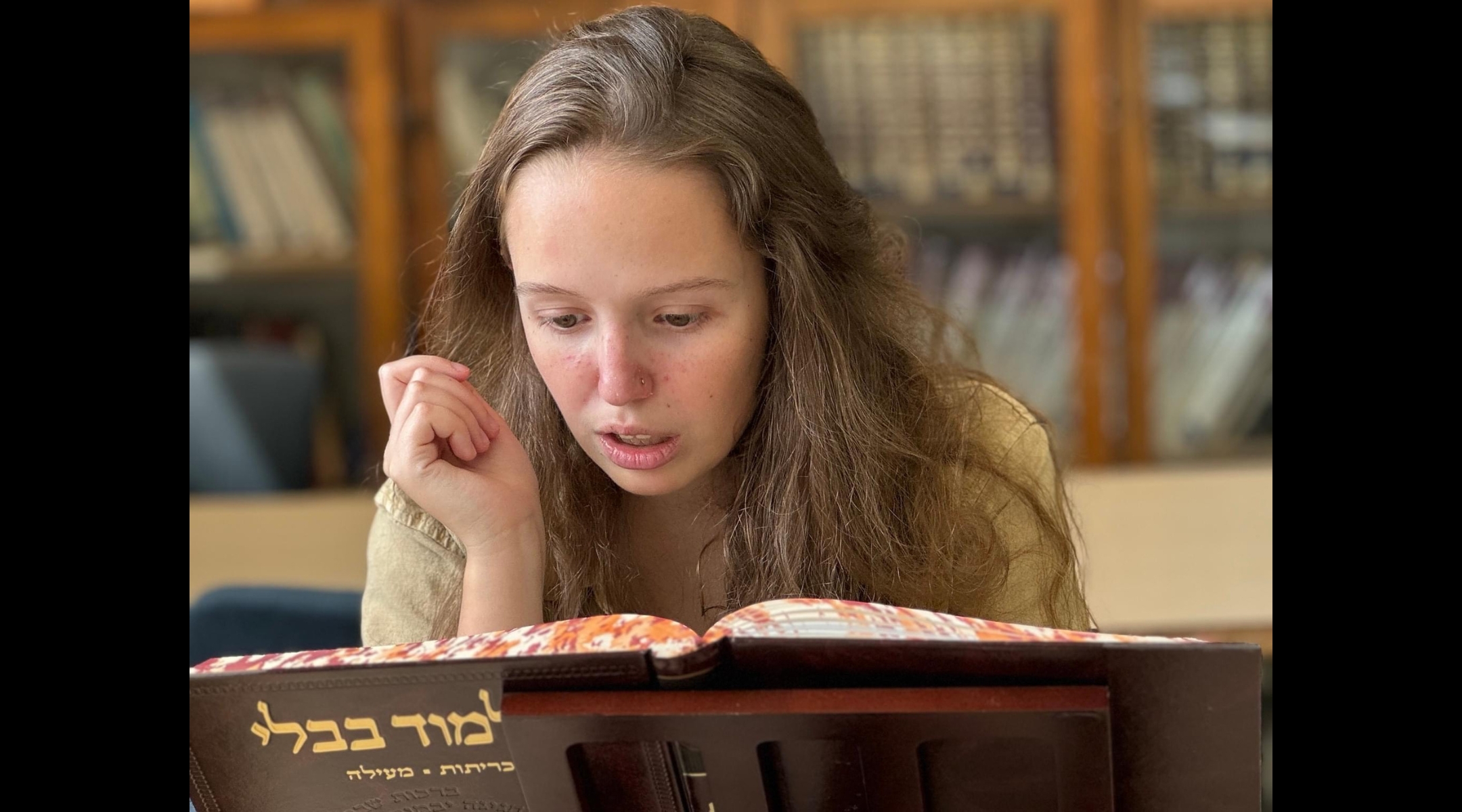Teenage girl read the Talmud five years faster than it usually takes
Elke Bentley, 18, read the whole Babylonian Talmud five years faster than the traditional reading cycle, which is usually the domain of men

Elke Bentley, 18, completed reading the Babylonian Talmud in just two-and-a-half years.(Courtesy Elke Bentley)
(JTA) — When she was 14 years old, Elke Bentley could hear her father’s online Talmud classes through the wall between her bedroom and his home office in Brookline, Massachusetts. The 5 a.m. start time for the daily Talmud learning her father had begun attending during the COVID-19 pandemic didn’t stop Elke from pulling her chair up to the wall and marking up in pencil her own copy of the Talmud, listening along to the men’s-only class.
The Daf Yomi, or regimen of page-a-day Talmud learning that stretches over seven-and-a-half years, is an endeavor typically reserved for men.
But Bentley had heard of people who had completed learning the Babylonian Talmud by the age of 20. And she wanted to be one of them.
Now back from her gap year in Israel, Bentley has completed a remarkable achievement in Jewish text study by reading the Talmud — more than 2,700 double-sided pages of densely printed Hebrew and Aramaic text, commentary and footnotes — in just two-and-a-half years.
Bentley is also a musician and heading to Harvard University in the fall. And she’s just 18.
“If I had been a boy, I’m not sure if I would have finished Shas,” Bentley, an only child, told the Jewish Telegraphic Agency, referring to an acronym often used to refer to the entire Talmud. “I would be learning other things. I would be learning way more in-depth, and I would be learning way more stuff and way different stuff and I would have access to way more resources.”
“Part of the reason why I wanted to do that is because that’s what I had access to,” she added. “Even if there wasn’t the Daf Yomi shiur [lesson] from my father, there’s Daf Yomi shiurs online.”
Reading the Talmud at this fast pace, called “bekiut,” or surface-style learning, has its benefits and drawbacks. (Bentley began learning at this pace when she was 16, utilizing the skills from her father’s Zoom class.)
“What it gives you is scope: It gives you a sense of all the different stuff that’s in the Talmud,” Rabbanit Leah Sarna, director of high school programs at Drisha, the institute for advanced Jewish learning based in New York, explained. “I think it gives you access to a lot of vocabulary and concepts that other people who go at a slower pace might not access.”
“On the flip side, you’re not learning all of the classic commentaries and questions and things like that,” she added. “But when you do this at a young age, what you’ve gained is scope. And then you go back and you do it more slowly, and you read all the commentaries and ask all the questions and you bring that whole scope into those questions. So it all just builds on each other.”
Bentley said her favorite way to learn, though, is in-depth, or “iyun.”
“Just because I learned it once in this very surface, fast way, doesn’t mean that I’m not going to do it again, and again, and again, and again,” she said.
Historically, women have been forbidden or discouraged from learning Talmud, especially in Orthodox and traditional homes. Bentley’s family attends a few Orthodox synagogues in Brookline, observes Shabbat and keeps kosher, and has always been supportive of her pursuit of Torah study. Women in the Reform and Conservative movements have long ignored those injunctions, and, in recent years, Orthodox Jewish women have been pushing back against their prescribed gender roles.
Drisha was founded in the 1980s and its women’s yeshiva in Israel was established in 2018. Officially non-denominational, it serves a heavily Orthodox clientele. New York City’s Yeshivat Maharat began ordaining Orthodox women rabbis in 2009. Miriam Anzovin, a formerly Orthodox Boston-based artist created a TikTok video series called “Daf Reactions” that simultaneously documents her progress along the Daf Yomi cycle and engages with the content in a humorous and provocative way. Rabbanit Michelle Cohen Farber teaches a popular online Daf Yomi class for women through the online portal Hadran.
Women have also had to fight to hold onto their access to Talmud learning in 2023 when Yeshiva University’s Stern College for Women canceled courses in beginner and intermediate Talmud citing “low enrollment.” The courses were restored shortly after, following a petition requesting their reinstatement and media coverage of the situation.
Bentley attended Yeshivat Drisha in Israel in 2023-2024, and the U.S.-based summer program in 2021. Leah Sarna was one of Bentley’s teachers, and observed her dedication to learning. After curfew, during the teen program, Bentley and her roommate would bring their Talmuds with them into their dorm, rather than leave them in the beit midrash, or study hall. On Friday nights, after Shabbat began, they would leave the dorm room door open to let the hallway light in so they could continue reading without turning on any lights and breaking the laws of the Sabbath.
“It’s quite unusual to have completed a study of the entire Talmud at such a young age, for men or for women,” Sarna told JTA. “But for women, obviously, it’s especially unusual, considering that women traditionally have not had access to these texts or to the skills necessary to spend [time] with them.”
Even in Jewish schools that offer Talmud classes for girls, the wider community’s available extracurricular offerings are usually closed to boys only, Sarna explained.
“There’s still way, way, way more opportunities for boys than there are for girls, even in environments where Modern Orthodox day schools are offering equal education,” she said.
Popular resources like All Daf, YUTorah online and Real Clear Daf offer recordings of shiurim given by rabbis, but because they cater to the Orthodox community, they are also exclusively taught by Orthodox men. Still, women can access them, as well as the online Jewish text library Sefaria, which contains complete English and Hebrew translations of Talmud.
Elke Bentley, an only child, credits having the space to seriously study Jewish texts to her parents’ and teachers’ support. “A very important thing in our house was for me to be fluent and have a very strong foothold in modern Hebrew and biblical Hebrew,” Bentley said. “What they told me is that they wanted me to have uninhibited access to the classic Jewish texts.”
Sarna says that’s encouragement not every female student gets.
“We have girls who come to our programs because they saw their parents investing in their brothers’ Talmud study and not in their own, and they were mad about it,” Sarna said. “Those are sometimes my most motivated students.”
In high school, Bentley did her morning prayers early to give herself another two hours before school to study.
Her teachers at the Maimonides School, a Modern Orthodox day school in Brookline, Massachusetts that includes Talmud learning for boys and girls, were also supportive. Bentley’s Talmud teacher Rabbi Oren Simhi permitted her to study texts of her own choosing in the back of the classroom as long as she was an active class participant, which gave her another hour and a half in the day.
“I kind of thought of it as like a sport that I just had a huge time commitment to,” said Bentley, who intends to study philosophy next year, but doesn’t know what her career path will be. “I find it so interesting. You can just see how we started to build Jewish civilization and Jewish communities. You can see how it came together. And it’s amazing.”
var theUrl = document.URL;var theUrlArray = theUrl.split(“//”);var theUrlpre = theUrlArray[1];var theUrlpostArray = theUrlpre.split(“/”);var theUrlpost = theUrlpostArray[0];(function(i,s,o,g,r,a,m){i[‘GoogleAnalyticsObject’]=r;i[r]=i[r]||function(){(i[r].q=i[r].q||[]).push(arguments)},i[r].l=1*new Date();a=s.createElement(o),m=s.getElementsByTagName(o)[0];a.async=1;a.src=g;m.parentNode.insertBefore(a,m)})(window,document,’script’,’//www.google-analytics.com/analytics.js’,’ga’);ga(‘create’, ‘UA-2449829-1’, theUrlpost, {‘name’:’uniqueTrackerName’});ga(‘uniqueTrackerName.send’, ‘pageview’);
A message from our Publisher & CEO Rachel Fishman Feddersen

I hope you appreciated this article. Before you go, I’d like to ask you to please support the Forward’s award-winning, nonprofit journalism so that we can be prepared for whatever news 2025 brings.
At a time when other newsrooms are closing or cutting back, the Forward has removed its paywall and invested additional resources to report on the ground from Israel and around the U.S. on the impact of the war, rising antisemitism and polarized discourse.
Readers like you make it all possible. Support our work by becoming a Forward Member and connect with our journalism and your community.
— Rachel Fishman Feddersen, Publisher and CEO





























